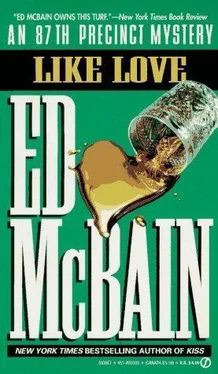Ed McBain - Like Love
Здесь есть возможность читать онлайн «Ed McBain - Like Love» весь текст электронной книги совершенно бесплатно (целиком полную версию без сокращений). В некоторых случаях можно слушать аудио, скачать через торрент в формате fb2 и присутствует краткое содержание. Жанр: Полицейский детектив, на английском языке. Описание произведения, (предисловие) а так же отзывы посетителей доступны на портале библиотеки ЛибКат.
- Название:Like Love
- Автор:
- Жанр:
- Год:неизвестен
- ISBN:нет данных
- Рейтинг книги:4 / 5. Голосов: 1
-
Избранное:Добавить в избранное
- Отзывы:
-
Ваша оценка:
- 80
- 1
- 2
- 3
- 4
- 5
Like Love: краткое содержание, описание и аннотация
Предлагаем к чтению аннотацию, описание, краткое содержание или предисловие (зависит от того, что написал сам автор книги «Like Love»). Если вы не нашли необходимую информацию о книге — напишите в комментариях, мы постараемся отыскать её.
Like Love — читать онлайн бесплатно полную книгу (весь текст) целиком
Ниже представлен текст книги, разбитый по страницам. Система сохранения места последней прочитанной страницы, позволяет с удобством читать онлайн бесплатно книгу «Like Love», без необходимости каждый раз заново искать на чём Вы остановились. Поставьте закладку, и сможете в любой момент перейти на страницу, на которой закончили чтение.
Интервал:
Закладка:
Carella pulled the knife from the dead man’s chest as soon as the assistant m.e. and the photographer were through with the stiff, carefully lifting the knife with his handkerchief tented over his hand, so as not to smear any latent prints that might be on the handle or blade.
“You going to make out the tag?” one of the laboratory boys asked him.
“Yeah,” Carella answered curtly.
He pulled three or four evidence tags from his back pocket, slid one loose from the rubber-banded stack, returned the others to his pocket, took the cap from his fountain pen, and began writing:
Automatically, he turned over the tag and filled in the information requested on the reverse side:
He looped the strings of the tag over the handle of the knife, fastening the two together where blade joined handle. Then, carrying the knife by the tag, he went over to where the laboratory technician was making a sketch of the body and its location.
“Might as well take this with you,” Carella said.
“Thanks,” the technician said. He accepted the knife and carried it over to his car which was parked partly on the grass, partly on the road that wound through the park. An ambulance had already arrived, and the attendants were waiting for everyone to finish with the body so they could cart it off to the morgue for autopsy. Hawes, standing some ten feet from where the attendants waited, was questioning a man who claimed he had seen the entire thing. Carella walked over aimlessly. He sometimes felt that all the official rigmarole following the discovery of a corpse was designed to allow a painless adjustment to the very idea of death by violence. The men took their pictures and made their sketches and collected their latent prints and whatever evidence was available, but these were only the motions of men who were stalling while they got used to the notion of dealing with a corpse.
“What time was this?” Hawes was asking the man.
“It must have been about a half-hour ago,” the man said. He was a thin old man with rheumy blue eyes and a running nose. He kept wiping his nose with the back of his hand, which was crusted with mucus.
“Where were you sitting, Mr. Coluzzi?” Hawes asked.
“Right there on that high rock. I was making a drawing of the lake. I come here every morning, and I sketch a little. I’m retired, you see. I live with my daughter and my son-in-law on Grover Avenue, just across from the park.”
“Can you tell us what happened, Mr. Coluzzi?” Hawes said. He noticed Carella standing beside him and said, “Steve, this is Mr. Dominick Coluzzi. He was an eyewitness to the killing. Mr. Coluzzi, this is Detective Carella.”
“How do you do?” Coluzzi said, and then immediately asked, “Let è Italiano, no?”
“Yes,” Carella answered.
“ Va bene,” Coluzzi said, smiling. “ Ho dicevo a questo suo amico …”
“I don’t think he understands Italian,” Carella said gently. “Do you, Cotton?”
“No,” Hawes answered.
“Mi scusi,” Coluzzi said. “I was telling him that I come here every morning to sketch. And I was sitting up there when the car pulled up.”
“What kind of a car was it, Mr. Coluzzi?” Carella asked.
“A Cadillac convertible,” Coluzzi said without hesitation.
“The color?”
“Blue.”
“Top up or down?”
“Up.”
“You didn’t happen to notice the license plate number, did you?”
“I did,” Coluzzi said, and he wiped his nose with the back of his hand. “I wrote it down on my pad.”
“You’re a very observant person, Mr. Coluzzi,” Hawes said, his brows raised in admiration.
Coluzzi shrugged and wiped his nose with the back of his hand. “It isn’t every day you see a man get stabbed to death,” he said. He was plainly enjoying himself. He was perhaps sixty-seven, sixty-eight, a thin old man whose arms were still muscular and wiry, but whose hands trembled slightly, a thin old man who had been let out to pasture, who came to the park each morning to sketch. This morning which had started out the way all other mornings did for him, something new had come into his life. He had been watching the lake and sketching the section near the dock where the row-boats bobbed in imperfect unison when suddenly a Cadillac had pulled to the side of the winding road, and suddenly murder had been done. And the old man, unnoticed on his high boulder overlooking the lake and the scene of the murder, alert, quick, and watched, and then shouted at the killer, and then had written down the number of the car’s license plate as it drove away. For the first time in a long time, the old man was useful again, and he enjoyed his usefulness, enjoyed talking to these two men who admired his quick thinking, who spoke to him as if they were speaking to an equal, as if they were speaking to another man, and not to some child who had to be let out into the sunshine each morning.
“What was the number of the plate, Mr. Coluzzi?” Carella asked.
Coluzzi opened his sketch pad. He had been working in charcoal, and a delicately shaded drawing of the boats at the dock filled half of the page. In one corner of the page, in charcoal, he had written:
Carella noticed that he had crossed the seven, in the Continental manner. He nodded briefly to himself, and then copied the number into his own pad.
“Can you tell us exactly what happened, Mr. Coluzzi?” he said.
“The car pulled to the curb. Down there.” Coluzzi pointed. “I noticed it right away because it came in with a lot of noise, tires shrieking, door slamming. And then a man ran up the embankment directly to this other man who was sitting on the bench there. The other man got up right away, and tried to run, but the one who got out of the car was too fast for him. He caught his arm and swung him around, and then he brought his right hand around and at first I thought he was only punching him, do you know, with his right hand, but instead he was stabbing him. I stood up on the rock and yelled at him, and that was when he turned and looked at me, and began running down to the car again. I think he was frightened. I don’t think he would have left his knife sticking in the man that way, if he hadn’t been frightened.”
“Are you frightened, Mr. Coluzzi?”
“Me? Of what?”
“Of telling us all this? Of possible reprisal?”
“Reprisal? What’s that?”
“ Vendetta ,” Carella said in Italian.
“Ma che cosa?” the old man said. “Vendetta? Che importa? I’m an old man. What are they going to do with their vendetta? Kill me? If this is the worst that can happen to me, I welcome it.”
“We appreciate your help, Mr. Coluzzi.”
“The way I figure it, a man is entitled in this country to come to the park and sit on a bench if he wants to. No one has the right to murder him while he is sitting on a bench minding his own business.”
“Thanks again,” Carella said.
“Prego,” the old man answered, and went back to sketching the rowboat, on the lake.
* * * *
The old man’s eyesight was good, even though he was sixty-seven years old. A call to the Bureau of Motor Vehicles confirmed that a blue 1960 Cadillac convertible bearing the license plate IS-7146 was registered to a Mr. Frank Dumas at 1137 Fairview in, of course, Isola. The “IS” on the plate made the Isola address mandatory. Carella thanked the clerk at the bureau, turned to Hawes, and said, “Too easy. It’s too damn easy.”
Hawes shrugged and answered, “We haven’t got him yet.”
They checked out a sedan and drove downtown to Fairview Street. Carella was thinking that he had drawn Lineup the next day, and that would mean getting up an hour earlier in order to be all the way downtown on time. Hawes was thinking that he was due in court on Monday to testify in a burglary case. They drove with the windows in the car open. The car was an old Buick, fitted with a police radio and new tires. It had been a good car in its day, but Carella wondered what it would do in a chase with one of this year’s souped-up models. Fairview Street was thronged with people who had come outdoors simply to talk to each other or to catch a breath of spring Mr. They parked the car at the curb in front of 1137, and began walking toward the building. The people on the front stoop knew immediately that they were cops. The sedan was unmarked, and both Carella and Hawes were wearing business suits, and shirts and ties, but the people sitting on the front stoop of the tenement knew they were cops and would have known it even if they’d walked up those steps wearing Bermuda shorts and sneakers. A cop has a smell. If you live long enough in an area infested with cops, you get to know the smell. You get to fear it, too, because cops are one thing you can never figure. They will help you one moment and turn on you the next. The people sitting on the front stoop watched Carella and Hawes, two strangers, mount the front steps and walk into the vestibule. The stoop cleared immediately. The two young men standing there immediately decided to go to the candy store for an egg cream. The old man from the building next door decided to go up on the roof and look at his pigeons. The old lady who lived on the ground floor packed up her knitting, picked up her folding chair, and went inside to watch daytime television. Cops almost always spelled trouble, and detectives spelled the biggest kind of trouble.
Читать дальшеИнтервал:
Закладка:
Похожие книги на «Like Love»
Представляем Вашему вниманию похожие книги на «Like Love» списком для выбора. Мы отобрали схожую по названию и смыслу литературу в надежде предоставить читателям больше вариантов отыскать новые, интересные, ещё непрочитанные произведения.
Обсуждение, отзывы о книге «Like Love» и просто собственные мнения читателей. Оставьте ваши комментарии, напишите, что Вы думаете о произведении, его смысле или главных героях. Укажите что конкретно понравилось, а что нет, и почему Вы так считаете.












